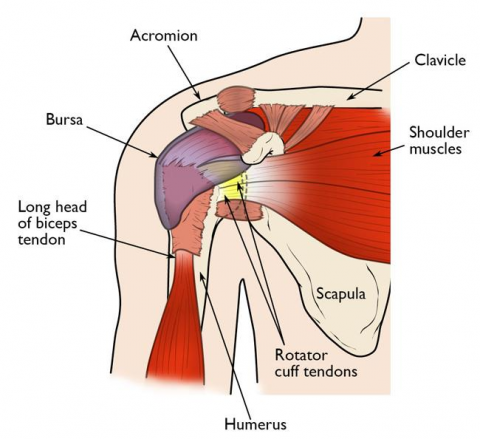Physio Insight: shoulder impingement
06th November 2018 - 19:49
Sarah Crisp, resident #TeamTCUK physiotherapist, talks about shoulder impingement and what you can do about it if you're suffering with this painful condition!
"One of the most common conditions I encounter as a physiotherapist is shoulder impingement. Chances are, if you haven't had it yourself, you'll know someone who has. You may have heard it referred to as something else; rotator cuff pain, bursitis and tendinitis being the most common alternative names. As a triathlete, you may hear it referred to as 'swimmer's shoulder'.
So what is shoulder impingement?
Impingement is an umbrella term which is used to describe pain localised to the outer, front aspect of the shoulder joint. The term encompasses a number of different structures which can result in pain in this area, including the rotator cuff, bursa, acromioclavicular joint (ACJ) and biceps.

The condition is usually characterised by pain on overhead activities. It is also very common to experience pain putting your hand behind your back, for example putting a jacket on. Typically it is painful to lie on the affected side.
What causes it?
Rarely is there one isolated cause for impingement. Often there are several potential contributing factors. Age, occupation and recreational activities all need to be taken into consideration.
There is typically a picture of tissue overload. Put simply, the tissue at the shoulder is not robust enough to withstand what you're asking it to do. In triathlon terms, this can be acute overload, for example a sudden increase in training load, or it can be more chronic, for example months of training with insufficient rest or poor technique (or both!).
Some common biomechanical contributing factors include;
- Rotator cuff weakness
- Poor posture (slumping/being very round shouldered)
- Reduced shoulder flexibility
- Increased shoulder flexibility (yes that's right, too little and too much movement at the shoulder can both be problematic!)
- Stiff thoracic spine (upper back)
- Reduced shoulder blade control
Inflammation, calcification within the rotator cuff and rotator cuff tears can also be contributing factors and can be identified with an ultrasound scan. Sometimes bony abnormalities can be found with the ACJ or acromion (part of the shoulder blade) which can lead to irritation of the soft tissues in the shoulder. These can be shown on an x-ray.
How is it diagnosed?
A physiotherapist will be able to confirm the diagnosis of shoulder impingement, however sometimes an x-ray or USS might be suggested to help determine how your injury is best managed.
What can be done about it?
Physiotherapy is the primary treatment for impingement. This is likely to consist of a tailored programme of exercises (stretching/strengthening as appropriate), hands on techniques, postural work and advice about load management (i.e. making sure that you're not doing too much or too little).
It is important that your coach is involved in the rehab process as they will be able to modify your training programme to reflect your current level of ability. One of the great advantages of triathlon, is that if we are unable to train in one discipline, we can maintain fitness and focus on weaknesses elsewhere.
Sometimes a course of non-steroidal anti-inflammatory medication (NSAIDs e.g. Ibuprofen/Naproxen) can be helpful.
If the condition is not improving with physiotherapy and NSAIDs, a steroid injection can sometimes be used in conjunction. More often than not, impingement can be managed without surgical intervention, however it may be necessary in cases that have not responded to non-surgical management.
From my perspective, I find impingement to be a very interesting condition to treat, because of the number of different factors that can contribute to the condition developing. Each individual requires their treatment to be tailored in response to what is felt to have contributed to the problem in the first instance.
If you're a swimmer with impingement, once you're able to swim comfortably it would defitneily be worth having some swim technique coaching and/or video analysis. If you're in or around Sheffield, you can do this through our specialist swim coaching arm, Swim Revolution."
If you think you or someone you know might be struggling with shoulder impingement, contact Sarah at Reactive Physio on 07943016282 or sarah@reactive-physio.co.uk to find out how physiotherapy might help you. Sarah is offering 10% off initial assessments for all TCUK athletes until 31st December 2018.
Glossary of terms
Rotator cuff - think of them as 'the core' of the shoulder. A group of small muscles deep in the shoulder that play a key role in shoulder movement and stabilisation.
Bursa - a fluid filled sac. They're present all over the body, preventing friction between tendon tissue and bone.
Acromioclavicular joint (ACJ) - At the end of your collar bone, where it meets the shoulder blade (scapula)